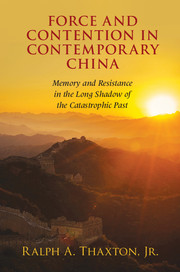 Force and Contention in Contemporary China
Force and Contention in Contemporary China Published online by Cambridge University Press: 05 August 2016
In Da Fo, as in countless other Chinese villages, the Maoist Leap had ratcheted up pressure on tillers to give up more of their grain harvests to the state, resulting in a “procurement famine” of unprecedented magnitude. A pervasive memory of this state plunder and its attendant starvation persisted over the next four decades. This memory influenced popular thinking about political authority, making it difficult for post-Mao politicians to overcome the deep crisis of legitimacy they inherited. In essence, the failure of the Maoist procurement system was so profound that the Communist Party lost the authority to effectively collect taxes in much of the countryside.
The Central government relied on the mechanism of the household responsibility system (baochan daohu) to resolve this legitimacy crisis. Under this system, each farm household was to enter into a contract that gave its members the right to manage their own agricultural production. The household, in turn, was responsible for meeting a state grain quota, after which it was allowed to use the surplus however it chose. In Da Fo and much of Henan province, the obligation to pay a tax of 20 jin (0.50 kilograms) per mu (hectare) – the equivalent of a fixed land tax – was retained alongside the baochan daohu quota. Although designed to re-create Central government legitimacy by returning a degree of freedom to tillers at the same time that it gave them an incentive to increase harvest yields, the household responsibility system was highly contested in Dongle county villages.
Da Fo's farmers refused to accept the system. They harbored two fears, both of which were shaped by memories of suffering in the Great Leap famine. To begin with, they saw the baochan daohu system as a watered-down version of procurement, which had not ended with the dismantling of the communes but continued to play a role in the development of the post-Mao tax burden. The baochan daohu system required tillers to meet a quota set by the party-state before they could deploy whatever was left for their own needs. But what if the grain harvest was poor and the required quota cut into the portion of the harvest needed for basic consumption?
To save this book to your Kindle, first ensure no-reply@cambridge.org is added to your Approved Personal Document E-mail List under your Personal Document Settings on the Manage Your Content and Devices page of your Amazon account. Then enter the ‘name’ part of your Kindle email address below. Find out more about saving to your Kindle.
Note you can select to save to either the @free.kindle.com or @kindle.com variations. ‘@free.kindle.com’ emails are free but can only be saved to your device when it is connected to wi-fi. ‘@kindle.com’ emails can be delivered even when you are not connected to wi-fi, but note that service fees apply.
Find out more about the Kindle Personal Document Service.
To save content items to your account, please confirm that you agree to abide by our usage policies. If this is the first time you use this feature, you will be asked to authorise Cambridge Core to connect with your account. Find out more about saving content to Dropbox.
To save content items to your account, please confirm that you agree to abide by our usage policies. If this is the first time you use this feature, you will be asked to authorise Cambridge Core to connect with your account. Find out more about saving content to Google Drive.